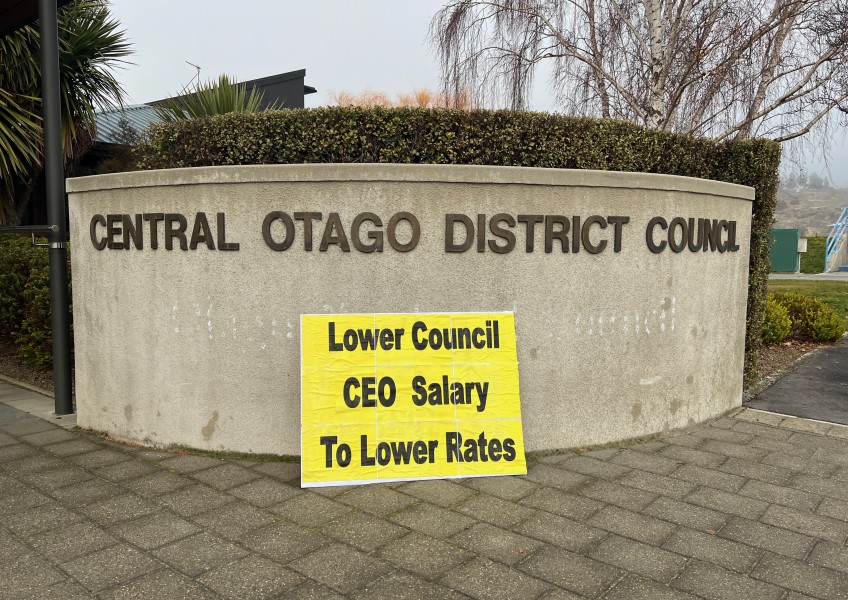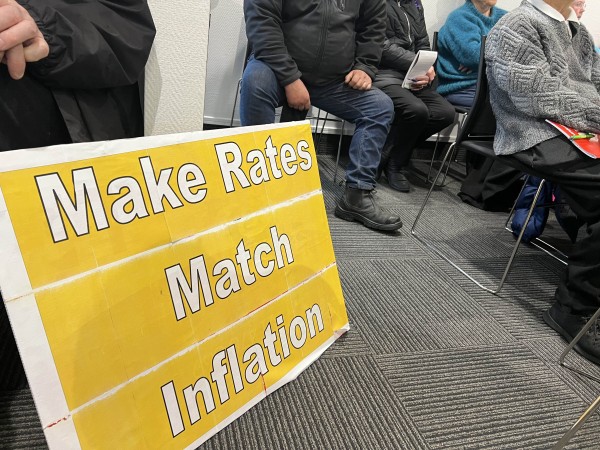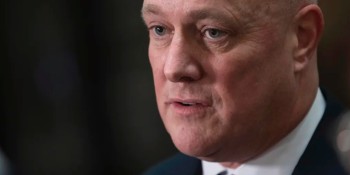CODC signs off 18.3 percent rates rise amidst pensioner protest

Central Otago residents are facing an average rates increase of 18.3 percent as the council today unanimously signed off on its spending plan for the year ahead.
But some properties in more built-up neighbourhoods across the district will be receiving rates bills up to 31 percent higher than last year's.
Close to a dozen protesters filled public seats at a meeting held at the council chambers in Alexandra, with speakers representing local Grey Power members urging the mayor and councillors to vote against the rise.
However those around the decision making table were resolute they would not "kick the can down the road" when it came to committing ratepayer funds to needed infrastructure and services across the district.

Large protest signs were brought into the public gallery at an Alexandra council meeting where an average rates rise of more than 18 percent was approved.
It didn't sit well with local Grey Power boss Stan Randle, who entered into a heated debate during the public forum with mayor Tim Cadogan.
"Because you want your roads built, this is more important than the people who are in your community," Mr Randle said.
The mayor strongly pushed back at the suggestion he and councillors did not have community wellbeing at the heart of their decision making.
"To say we don't care is very hurtful.
"We totally understand the effect an increase such as this will have on households, but options were limited given the cost and compliance issues we and all councils face."
Mr Randle was followed in the public forum by former ACT MP and Roxburgh farmer Gerry Eckoff, who demanded resignations from elected members if the rates rise passed.
Mr Eckhoff said there was "massive anxiety" among residents who would struggle to budget for the rates hike.
"You simply cannot be wilfully blind to the harm that you may choose to do with the increase," he told the mayor and councillors.
"You must accept your responsibilities firstly to the people of this community, not to the wellbeing of the council."
It was his view some residents would be forced to leave the district because of the additional rates burden.
"It is better to kick the can down the road than ratepayers down the road," Mr Eckhoff said.
The rates rise is significantly higher than the 5.6 percent flagged in the council's last Long Term Plan signed off in 2021.
Council finance staff told councillors in a report presented prior to today's meeting inflationary factors, market interest rates and increased regulatory requirements within Three Waters are behind the unexpected jump in costs.
When given the opportunity to speak prior to the vote, deputy mayor and Cromwell councillor Neil Gillespie challenged a view expressed in the public forum that there is one uniform answer to what it is the community wants.
"I'm charged with making a decision; it's not going to be popular."
Vincent ward councillor Tamah Alley said so many of the costs facing the district are outside of the council's control.
"We're continually being asked to cut our cloth to fit, but that is very difficult when the design, materials and timeframe for completion are being specified by central government or by our resource consent conditions."
Cromwell councillor Nigel Mckinlay said the council had no real control over costs accounting for more than 80 percent of the rates rise.
He said finding savings would mean turning to cutting services across the district like museums, swimming pools, and libraries.
First-term Cromwell councillor Sarah Browne said she will struggle to find the money to pay her own household's rates rise, and is considering pausing KiwiSaver payments to make ends meet.
But when it came to the district's ballooning budgets for vital projects her view was: "We've got to pay it, there's nothing else we can do".
Sitting around the decision making table had helped her understand the challenges facing the district and local government, she said.
"I feel like I get it better and I can explain it better."
Vincent ward councillor Tracey Paterson said elected members were charged with making a "very unpopular" decision, and she acknowledged it would be hard for some to receive.
"I want the community to know we have heard, and we have listened."
She said elected members had heard people's concerns around the council table, as well as at the supermarket, the pub, the petrol station and even at their own dinner tables.
"It doesn't make the decision making process any easier."
Although this should have been a Long Term Plan adoption year for the council, elected members opted in February to take up an offer from central government to defer locking in their next 10-year plan until next year.


























